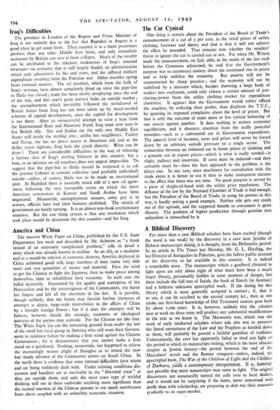Iraq's Difficulties
The presence in London of the Regent and Prime Minister of Iraq is not entirely due to the fact that Baghdad in August is a good place tp get away from. Their country is in a more precarious position than any other Middle East State, and only immediate assistance by Britain can save it from collapse. Much of the trouble can be attributed to the inherent weaknesses of Iraq's internal structure—an economy that is still largely feudal, an administration which only administers by fits and starts, and the inflated military expenditure resulting from the Palestine war. Other troubles spring from external sources. The oil royalties, which form the bulk of Iraq's revenue, have almost completely dried up since the pipe-line to Haifa was closed ; trade has been slowly atrophying since the end of the war, and this year's grain harvest lacks an outside market ; the unemployment which inevitably followed the withdrawal of British forces from Iraq has not been taken up by much-needed schemes of capital development, since the capital for development is not there. After an unsuccessful attempt to raise a loan from the International Bank and Monetary Fund, Iraq must now turn to her British ally. She and Jordan arc the only two Middle East States still inside the sterling area ; unlike her neighbours, Turkey and Persia, she has no direct accesS to American aid, and as the dollar screw tightens, Iraq feels the pinch directly. What can be done ? There are considerable difficulties in the way of releasing a further slice of Iraq's sterling balances in this country, but a loan, or an advance on oil royalties, does not appear impossible. To suggest that the pipe-line to Haifa should be reopened is to ask the present Cabinet to commit collective (and probably individual) suicide—unless, of course, Haifa was to be made an international port. In Baghdad there is naturally much talk of a new oil agree- ment, following the very favourable terms on which the latest American concessions in Kuweit and Saudi Arabia have been negotiated. Meanwhile, unemployment mounts, army pay is in arrears, officials have had their bonuses abolished. The wheels of government are barely turning. It is an almost text-book revolutionary situation. But the one thing certain is that any revolution which took place would be disastrous for this country—and for Iraq.






























 Previous page
Previous page